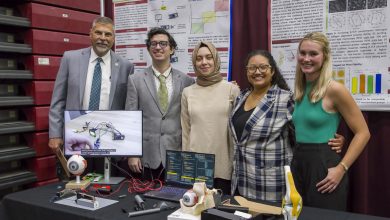Is My Smart TV Spying on Me?
One Big Question with Heather Crawford

Not that long ago, things were just things. Lamps lit up dark spaces, refrigerators kept food from spoiling, and TVs provided entertainment. With the advent and subsequent explosion of the internet, things have stopped being mere things. Now, lamps can be connected to the internet, your refrigerator can tell you when your milk has soured, and your TV may become a source of information about your habits and preferences.
Recently, several smart TV manufacturers have been accused of tracking customers’ TV preferences and selling this information to other companies. This practice, a form of digital “spying,” is unsettling, but is not a clear-cut case of privacy violation. We have often agreed (implicitly or explicitly) to having our data used in this way, either via hastily clicked agreements when setting up our new toy or through default settings buried in hard-to-navigate menus.
By allowing these devices internet access, we’re setting the stage for potential privacy violation. These devices can measure our preferences, as evidenced by the smart TV manufacturers, as well as our movements (via GPS and Location Services), our faces and private moments via integrated cameras, and our conversations via “always on” voice-controlled devices like Amazon Echo. This level of tracking is unprecedented, and comes from devices we may not suspect, like a smart lightbulb, TV or refrigerator.
What can we do to protect ourselves and our privacy? The answer is simple but unsatisfying: not much, unless we want to give up the very functionality that first drew us to purchase the smart device. We can remove the device’s links to the internet, and turn off tracking services on smart TVs. The upshot of this is that our smart TV (or lamp, or refrigerator) reverts to being dumb.
There’s hope, though. The missing pieces to this puzzle lay in two places: standards bodies must provide privacy and security guidance such as whether opt-in or opt-out policies must be in place, and the device manufacturers build conformance to the guidance into their devices. As a consumer, knowledge is the best form of defense. Know what data your devices can gather, and read dialog boxes and settings carefully when adding new devices to your home to ensure you know what’s being done with your personal information. Knowledge is power when it comes to privacy.
Heather Crawford is an assistant professor in the Harris Institute for Assured Information and the College of Engineering and Computing. Her research interests include privacy, security and trust for the Internet of Things, behavioral modeling, alternative authentication and usable security.





